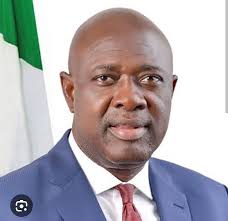The Federal Government has urged International Oil Companies (IOCs) operating in Nigeria to ramp up investments in the country’s oil and gas sector, emphasizing the administration’s investment-friendly policies and incentives designed to foster growth. Senator Heineken Lokpobiri, Minister of State for Petroleum Resources (Oil), made the appeal during the Cross Industry Group (CIG) Meeting in Florence, Italy, organized by IOCs operating in Nigeria.
The discussions focused on overcoming industry challenges, meeting domestic energy demands, and expanding Nigeria’s role in Sub-Saharan Africa’s energy market.
According to a statement by his Special Adviser on Media and Communication, Nneamaka Okafor, Lokpobiri reassured stakeholders that President Bola Tinubu’s administration had created an enabling environment for seamless and profitable operations.
“The government has fulfilled its part by implementing investment-friendly fiscal policies, including the President’s Executive Order to incentivize deepwater investments,” Lokpobiri said. “Now, it is up to the IOCs and other operators to make strategic investment decisions that will boost production and sustain industry growth.”
He further stressed the importance of supporting local refining efforts as more refineries come online, requiring a steady supply of crude oil. Enhancing production capacity, he noted, is crucial for meeting both domestic and international energy obligations. In alignment with the government’s goal to increase production, Lokpobiri reiterated that authorities would enforce the “drill or drop” provisions of the Petroleum Industry Act (PIA) where necessary.
“We cannot allow assets to remain idle for 20 to 30 years without development. If an asset is left unutilized for decades, it does not benefit its owners or contribute to the national economy,” he said.
To address underutilized assets, he encouraged industry players to explore options such as shared resource development for adjacent fields, farm-out agreements, or releasing dormant assets to operators willing to invest in production.
“If operators fail to develop these assets, the government will reallocate them to those prepared to put them to productive use,” Lokpobiri warned.
He also urged companies to consider farm-out agreements for assets near existing infrastructure instead of incurring high costs on new Floating Production Storage and Offloading (FPSO) units. Osagie Osunbor, Chairman of the Oil Producers Trade Section (OPTS), commended the Federal Government’s direct engagement with industry stakeholders and its commitment to fostering investment.
“We appreciate the government’s dedication to creating a favorable investment climate. The minister’s engagement has provided valuable insights and challenged us to step up efforts to enhance production,” Osunbor stated.
The Federal Government reaffirmed its commitment to ensuring a thriving oil and gas sector and expects operators to match its efforts by making tangible investments that drive industry growth, sustainability, and national energy security.













